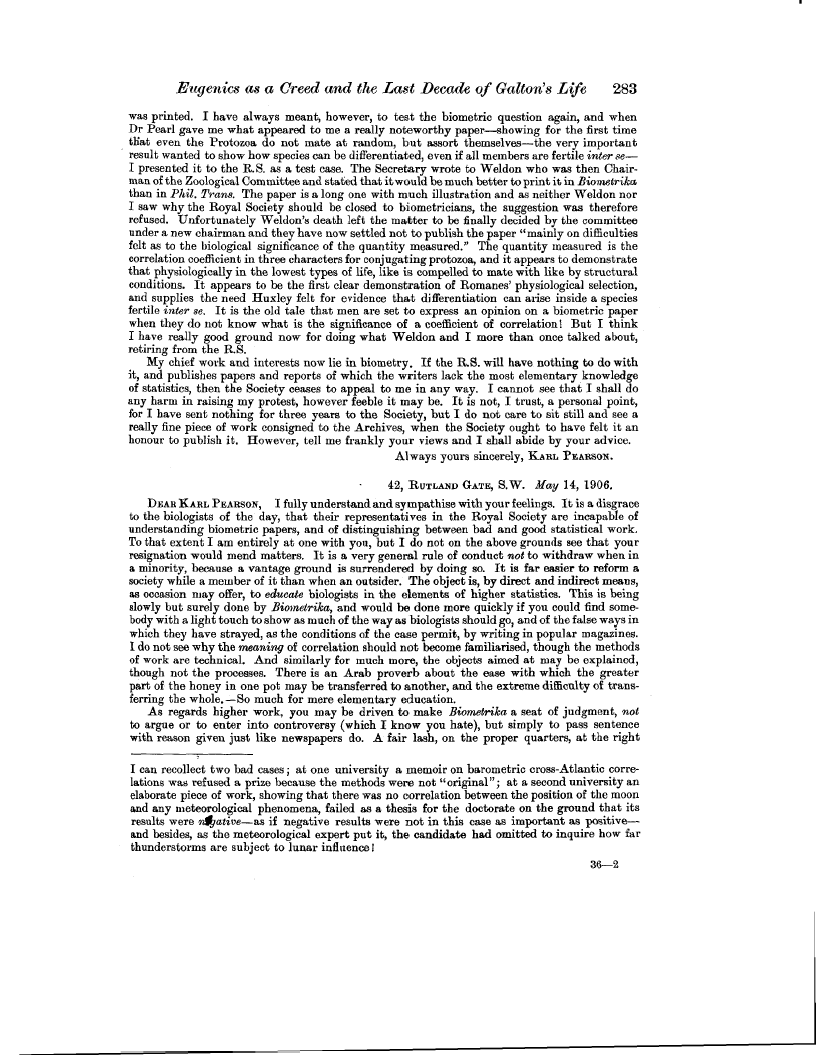| ||||||

OCR Rendition - approximate
Eugenics as a Creed and the Last Decade of Galton's Life 283 was printed. I have always meant, however, to test the biometric question again, and when Dr Pearl gave me what appeared to me a really noteworthy paper-showing for the first time that even the Protozoa do not mate at random, but assort themselves-the very important result wanted to show how species can be differentiated, even if all members are fertile inter seI presented it to the R. S. as a test case. The Secretary wrote to Weldon who was then Chairman of the Zoological Committee and stated that it would be much better to print it in Biometrika than in Phil. Trans. The paper is a long one with much illustration and as neither Weldon nor I saw why the Royal Society should be closed to biometricians, the suggestion was therefore refused. Unfortunately Weldon's death left the matter to be finally decided by the committee under a new chairman and they have now settled not to publish the paper "mainly on difficulties felt as to the biological significance of the quantity measured." The quantity measured is the correlation coefficient in three characters for conjugating protozoa, and it appears to demonstrate that physiologically in the lowest types of life, like is compelled to mate with like by structural conditions. It appears to be the first clear demonstration of Romanes' physiological selection, and supplies the need Huxley felt for evidence that differentiation can arise inside a species fertile inter se. It is the old tale that men are set to express an opinion on a biometric paper when they do not know what is the significance of a coefficient of correlation? But I think I have really good ground now for doing what Weldon and I more than once talked about, retiring from the R.S. My chief work and interests now lie in biometry. If the R.S. will have nothing to do with it, and publishes papers and reports of which the writers lack the most elementary knowledge of statistics, then the Society ceases to appeal to me in any way. I cannot see that I shall do any harm in raising my protest, however feeble it may be. It is not, I trust, a personal point, for I have sent nothing for three years to the Society, but I do not care to sit still and see a really fine piece of work consigned to the Archives, when the Society ought to have felt it an honour to publish it. However, tell me frankly your views and I shall abide by your advice. Always yours sincerely, KARL PEARSON. 42, RUTLAND GATE, S. W. May 14, 1906. DEAR KARL PEARSON, I fully understand and sympathise with your feelings. It is a disgrace to the biologists of the day, that their representatives in the Royal Society are incapable of understanding biometric papers, and of distinguishing between bad and good statistical work. To that extent I am entirely at one with you, but I do not on the above grounds see that your resignation would mend matters. It is a very general rule of conduct not to withdraw when in a minority, because a vantage ground is surrendered by doing so. It is far easier to reform a society while a member of it than when an outsider. The object is, by direct and indirect means, as occasion may offer, to educate biologists in the elements of higher statistics. This is being slowly but surely done by Biometrika, and would be done more quickly if you could find somebody with a light touch to show as much of the way as biologists should go, and of the false ways in which they have strayed, as the conditions of the case permit, by writing in popular magazines. I do not see why the meaning of correlation should not become familiarised, though the methods of work are technical. And similarly for much more, the objects aimed at may be explained, though not the processes. There is an Arab proverb about the ease with which the greater part of the honey in one pot may be transferred to another, and the extreme difficulty of transferring the whole.-So much for mere elementary education. As regards higher work, you may be driven to make Biometrika a seat of judgment, not to argue or to enter into controversy (which I know you hate), but simply to pass sentence with reason given just like newspapers do. A fair lash, on the proper quarters, at the right I can recollect two bad cases ; at one university a memoir on barometric cross-Atlantic correlations was refused a prize because the methods were not "original"; at a second university an elaborate piece of work, showing that there was no correlation between the position of the moon and any meteorological phenomena, failed as a thesis for the doctorate on the ground that its results were n>4ative-as if negative results were not in this case as important as positiveand besides, as the meteorological expert put it, the candidate had omitted to inquire how far thunderstorms are subject to lunar influence f 36-2
|